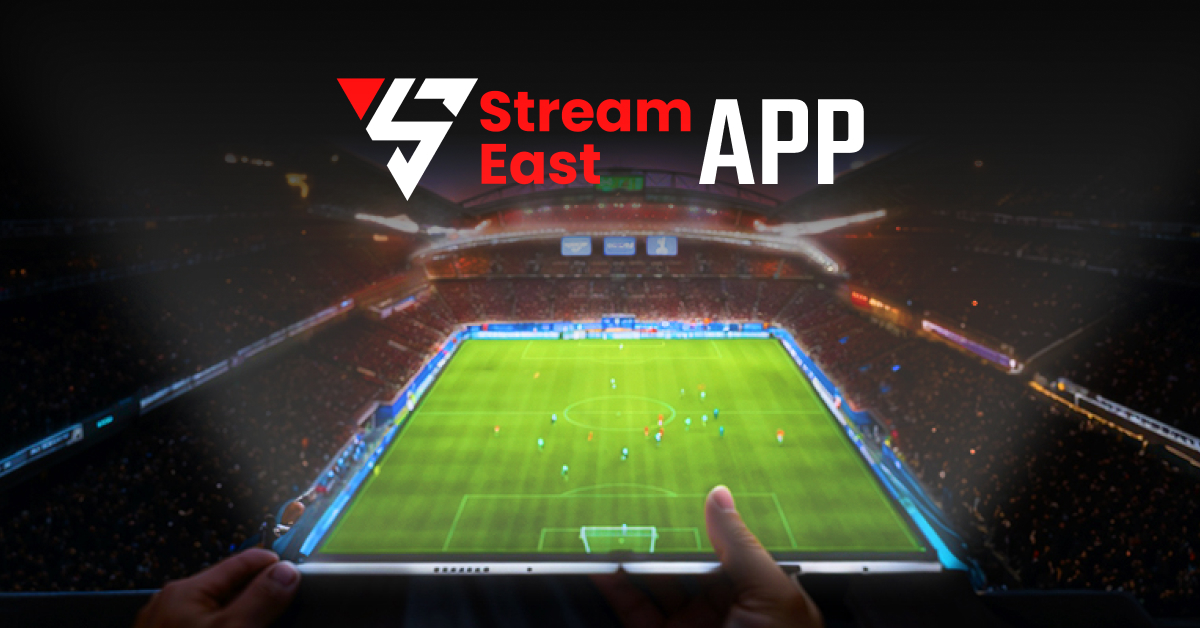Real estate has seen the most significant change, with over 60% of buyers now searching for homes online. Realtor.com has changed the game with its new apps by giving users new and easier ways to search through the enormous listings available. This shift presents a significant opportunity for entrepreneurs and businesses to invest in, given the potential of the emerging market.
In 2024, the global real estate market was estimated to be around $3.8 trillion, and the figure is expected to grow as more people utilize mobile apps.
Creating an app like Realtor.com is more than just capitalizing on the opportunity – it’s developing a stronger platform to give buyers and sellers what they need: gadget technology. In this blog post, we will tell you everything about how to develop an app like Realtor, including cost, features, and many more. So are you ready?
Top 8 Realtor Alternatives
Let’s dive into the list of these excellent realtor alternatives that you need to have in your pocket before digging deeper into the process of realtor app development.
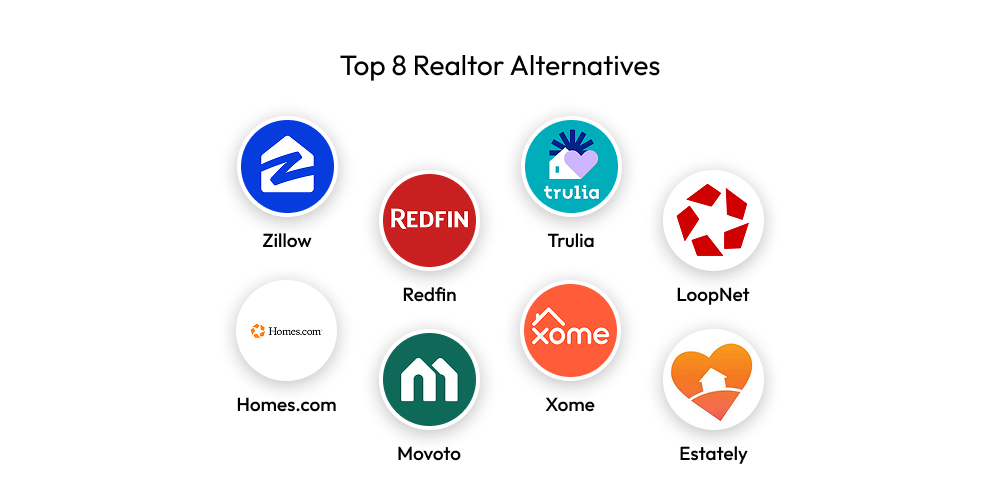
App Name |
Launch Year |
Downloads (Approx.) |
USP (Unique Selling Point) |
| Zillow | 2006 | 100M+ | Largest real estate database in the U.S. with Zestimate® tool |
| Redfin | 2004 | 10M+ | Tech-powered brokerage with real-time MLS updates and savings |
| Trulia | 2005 | 10M+ | Neighborhood insights, school ratings, and lifestyle maps |
| LoopNet | 1995 | 5M+ | Specializes in commercial real estate listings |
| Homes.com | 1999 | 5M+ | Fast property search with helpful agent tools and calculators |
| Movoto | 2005 | 1M+ | Offers agent-matching and personalized listing updates |
| Xome | 2015 | 1M+ | Real estate auctions with end-to-end digital buying experience |
| Estately | 2006 | 1M+ | Fast home search with direct MLS data and simple interface |
What is the Realtor App?
The Realtor App is a real estate mobile application that assists users looking to buy or rent houses, find home value estimates, or check current market selling prices. With the Realtor.com real estate mobile application, users can get access to extensive search filters and can use interactive maps, affordability, and mortgage calculators.
An app like Redfin or Realtor offers 3D tours of homes, which are unique and valuable. Realtor.com initially launched its iPhone app on January 13, 2010, and released the Android version on November 4, 2010. Currently, the Realtor.com app has over 10 million downloads on the Google Play Store.
Real Estate App Market: Key Statistics and Trends
- The global rental applications in the real estate market are forecasted to grow significantly, from USD 12.03 billion in 2024 to USD 38.4 billion in 2034, with a 12.30% compound annual growth rate (CAGR) during the forecast period.
- The general PropTech market size was USD 36.55 billion in 2024, and it is expected to grow to USD 88.37 billion by 2032, with a CAGR of 11.9%, driven by the increased adoption of AI, machine learning, and AR in real estate solutions.
- Zillow remains a market leader; in August 2024, Zillow reported 9.3 billion visits to its app and website.
- Zillow also reported 228 million average active users on its app and website through Q2 2024.
- Realtor.com 2024 has an audience of over 30 million unique monthly users, and their app reached over 2.2 million monthly active users in March 2024.
- Redfin’s app also experienced a steady upward trend in monthly active users, reaching an audience of over 3.2 million in March 2024, which indicates high engagement levels on mobile.
- Mobile application use has now exploded, with 62.1% of the Home Finder app market share. Residential applications are expected to lead the rest of the market at 65.3% in 2024.
- The CoStar Group is one of the largest commercial real estate resources and marketplaces, with a total revenue of $2.74 billion in 2024, an 11% year-over-year increase from 2023.
Why Should Entrepreneurs Invest in Building an App Like a Realtor?
In today’s digital world, the real estate industry is going full tilt towards online internet platforms and mobile application enhancement. If you are an entrepreneur wanting to invest in the growing market by creating a home-buying app, here are five reasons why you should invest in real estate app development:
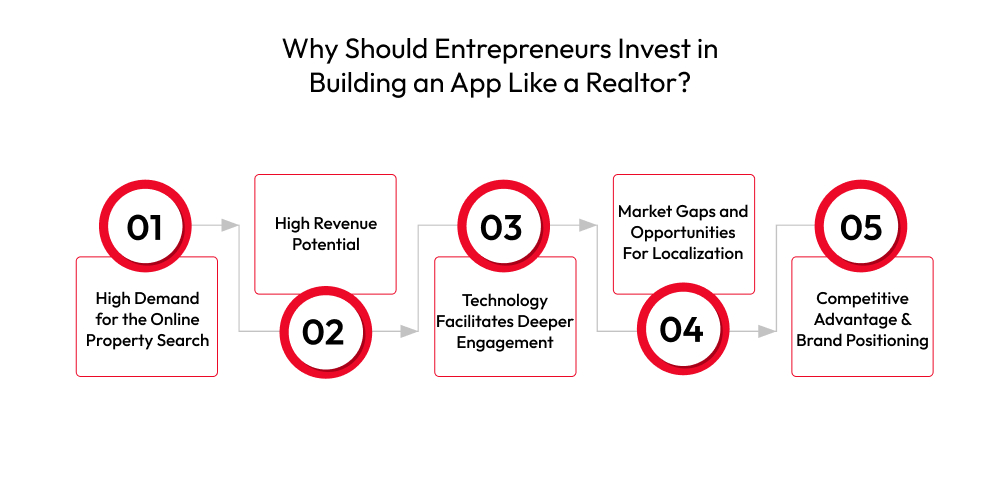
1. High Demand for the Online Property Search
Millions of users prefer mobile apps for browsing, comparing, and buying or renting properties. The demand for digital real estate searching platforms has never been higher. Property marketplace apps remove the barriers to property discovery, saving users time and offering incredible conveniences.
2. High Revenue Potential
If you develop real estate apps like Zoopla, several monetization opportunities can be found in a featured listing of properties, subscription plans, ads from 3rd party sources, and commission earned from transactions. In terms of revenue models and recurring income streams, a property marketplace app can be a primary source of growth and income.
3. Technology Facilitates Deeper Engagement
Technologies, including AI, AR/VR, and geolocation, provide immersive, intelligent, and personalized user experiences through a Realtor clone app. New technology tends to attract more tech-savvy users, in addition to the potential for increased residential listing app retention among existing customers.
4. Market Gaps and Opportunities For Localization
Although large global platforms already serve the real estate industry, there continues to be a huge opportunity to (for example) localize the service, create a niche market, or serve an unserved market.
Entrepreneurs can build an app like Rightmove that enhances the capabilities of a residential listing app or targets a specific demographic, locale, or type of property to provide value.
5. Competitive Advantage & Brand Positioning
A highly professional and feature-rich home finder app with updated properties to display gives your business a chance to emerge as an innovator in a traditionally conservative property market. This increases credibility, builds brand recognition, and can provide you with an edge over both traditional and slower-to-recognize competitors.
Types of Real Estate App Development
Before we take you on the journey to make an app like Realtor, you need to learn about the types. In this section, we have compiled types of real estate applications that are trending in the market from 2025 to 2030.
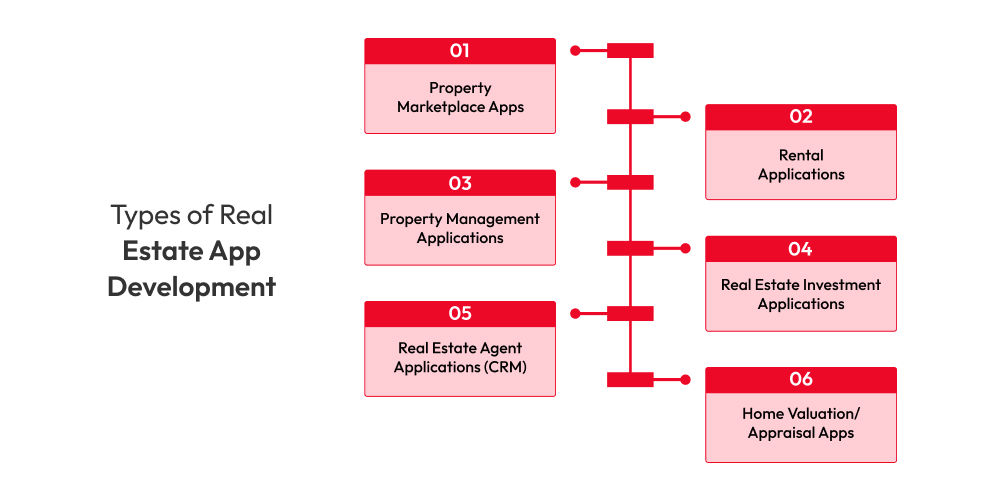
1. Property Marketplace Apps:
These apps connect buyers, sellers, and agents in a single application. You can search listings, filter search results, schedule viewings, and directly communicate with sellers and licensees. Zillow and Realtor.com have extensive databases of properties and have streamlined the search process for users.
2. Rental Applications:
Rental applications focus on the rental process with tenants and landlords. The Realtor.com app sometimes features search functions for apartments, allows online rent payments, tracks leases, and facilitates maintenance requests. Airbnb and Zillow Rentals are prime examples.
3. Property Management Applications:
Property management apps can help landlords and property managers manage multiple properties. Often, these applications can track bill payments, automate rent collection, track who you have communicated with, maintain a maintenance log, and track all financial transactions. These items enable landlords to perform their administrative duties with minimal effort.
4. Real Estate Investment Applications:
Real estate app investment services enable users to conduct market analysis, run property performance through a valuation process, and make informed decisions on which properties to buy and sell. Some applications provide crowdfunded real estate investments, ROI calculators, and notifications or alerts on trends.
5. Real Estate Agent Applications (CRM):
Real estate agent applications allow real estate professionals to manage their clients, track leads, change the statuses of listings, set appointments, and manage communications with many different stakeholders. The applications enhance agent productivity by retaining communication with clients, documents, and sales information all in one place.
6. Home Valuation/Appraisal Apps:
These property listing apps rely on algorithms that utilize AI and ML to assess property values based on several data points, including location, market trends, and other comparable sales. They help to provide insight for buyers, sellers, and investors to make informed decisions.
Interested in a chatbot demo, pricing, or more info? Fill out the form our expert will contact you shortly.
-
Chatbot Demo
-
Cost to Develop an app
-
Industry Report
-
Case Study
6 Stages to Build An App Like Realtor
Let’s go, solo entrepreneurs. The time has come when you need to know about the step-by-step guide to making an app like Realtor. So, let’s get this segment started.
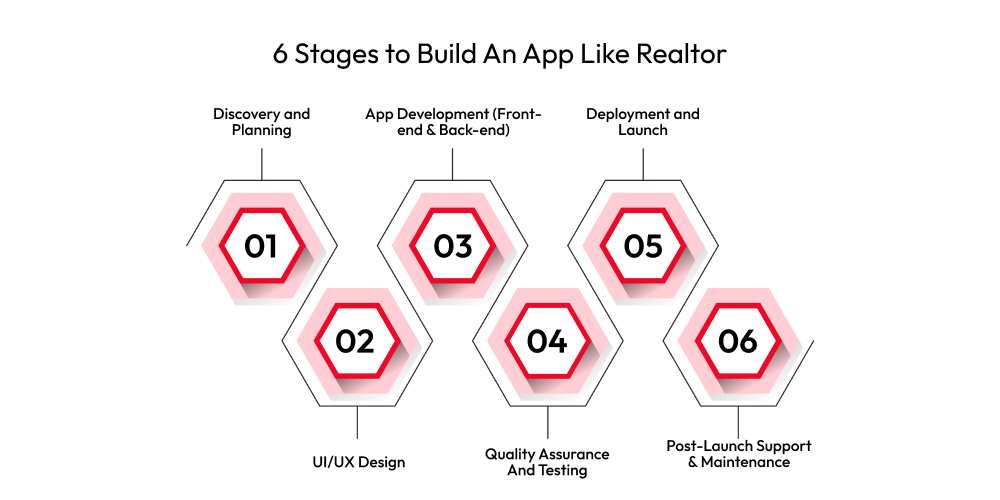
1. Discovery and Planning:
The process begins with research and planning. Here, the real estate app development company will review your vision, target audience, and market competitors. They will define features, user flows, technical aspects, and other key elements.
This phase will conclude with a roadmap for the property listing app, a stack of chosen technologies, and a comprehensive understanding of scope and functionality, which maintains a focus on your goals while also adhering to the development company’s opinion.
2. UI/UX Design:
In the second step to create an app like Realtor, the UI/UX Design phase is where the development company focuses on the user’s experience and the user interface. In this stage, wireframes and mockups will be created to illustrate the layout and several functions that the app will have.
The designers will create a simple user navigation system to make the app visually appealing and easy to use. The goal is to create an app that is easy to use, providing appealing content while allowing users to find properties or other real estate services easily they are looking for.
3. App Development (Front-end & Back-end):
Here’s where the coding begins. In the last two steps, they created wireframes and mocked up the designs to enhance the app’s usability. The front-end auction app development team will create a property rental app by building a user interface that allows users to interact with it.
The front-end development team will also ensure the real estate finder is visible and interactive across all devices. This stage is continuous and requires a commitment from all software developers to collaborate, follow coding best practices, and develop and maintain a stable and efficient application foundation.
4. Quality Assurance And Testing:
Testing is a crucial part of identifying and resolving bugs, performance issues, and security vulnerabilities. QA engineers perform functional, usability, performance, and security testing on various devices and different operating systems.
Testing occurs in an iterative process to ensure the real estate portal is stable, reliable, and supports a seamless user experience, that it meets all specifications, and that the real estate platform is then ready for launch.
5. Deployment and Launch:
Move to the second last stage to create an app like Realtor. Once the app passes QA testing, it’s ready for deployment to app stores (App Store and Google Play). This will include submitting the app and following submission guidelines for each platform (it is always a good idea to check the submission guidelines prior; there are always some subtle differences between the two).
Additionally, you should optimize your app store listing, write a compelling description, and take additional screenshots, among other steps. A launch plan will be developed, which may include marketing activity to gain initial user traction.
6. Post-Launch Support & Maintenance:
Last but not least is the stage for the digital property app, where you’re about to launch the application. This stage involves continuously monitoring the app’s performance, regularly analyzing app user feedback, and making updates, as well as further updates.
The marketplace app development company will continue to monitor app performance and provide maintenance, bug fixes, security patches, and enhancements to keep the app relevant, updated, and competitive within the market, thereby maximizing its chances of a continued lifespan and an evergreen opportunity for the end user.
Key Features Of Realtor Clone App Development
Having an adequate list of housing app features is one of the ideal steps that you need to have in your pocket. Many entrepreneurs overlook this fact because they believe having an idea about technology and a platform is sufficient, but that’s not the case. Here is the list of features that you should keep in mind if you’re building a property search app.
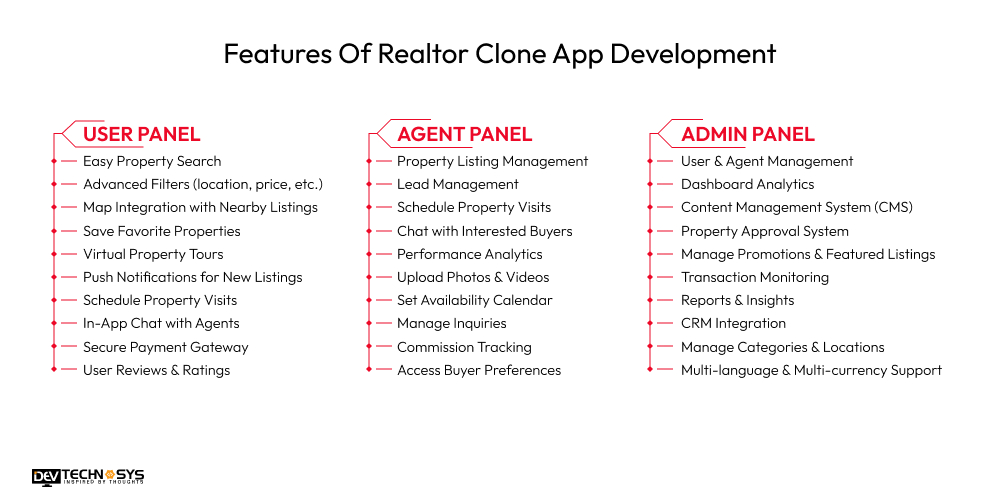
User Panel Features |
Agent Panel Features |
Admin Panel Features |
| Easy Property Search | Property Listing Management | User & Agent Management |
| Advanced Filters (location, price, etc.) | Lead Management | Dashboard Analytics |
| Map Integration with Nearby Listings | Schedule Property Visits | Content Management System (CMS) |
| Save Favorite Properties | Chat with Interested Buyers | Property Approval System |
| Virtual Property Tours | Performance Analytics | Manage Promotions & Featured Listings |
| Push Notifications for New Listings | Upload Photos & Videos | Transaction Monitoring |
| Schedule Property Visits | Set Availability Calendar | Reports & Insights |
| In-App Chat with Agents | Manage Inquiries | CRM Integration |
| Secure Payment Gateway | Commission Tracking | Manage Categories & Locations |
| User Reviews & Ratings | Access Buyer Preferences | Multi-language & Multi-currency Support |
Advanced Features of an App Like Realtor
Having a list of the advanced features of a property search application is important. Here, we have got you the amazing and user-friendly functions that you need to have if you want to become the trend in the real estate market in 2050.
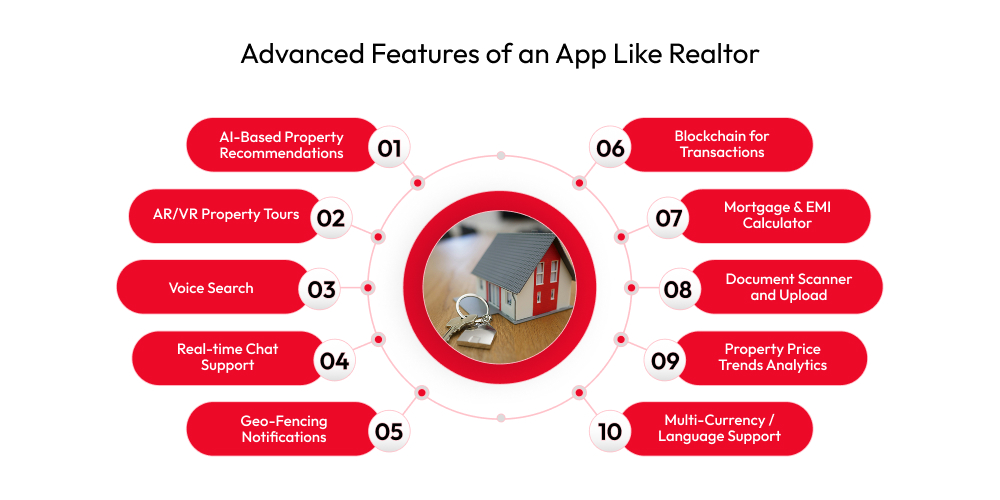
-
AI-Based Property Recommendations
Uses user preferences, behavior, and prior search history to provide highly personalized property recommendations utilizing machine learning algorithms that improve user experience and increase conversion rates.
-
AR/VR Property Tours
The Realtor Commission app enables users to take immersive, 360-degree real-life property tours from the comfort of their own homes, providing an extra realistic view of properties while eliminating the need for physical tours.
-
Voice Search
Real estate apps like Zillow enable users to search for property listings using voice commands, providing faster access and an easier browsing experience for mobile users and those seeking a hands-free experience.
-
Real-time Chat Support
The app, similar to Realtor, offers users a texting feature that allows them to send messages to agents or customer care representatives instantly, thereby improving communication, minimizing or eliminating wait time, and increasing user satisfaction throughout the entire property inquiry process.
-
Geo-Fencing Notifications
Realtor alternatives provide users with push notifications as soon as they enter a specific geographic area (city) or are relevant to nearby property listings. This enhances user engagement and increases visibility for local property listings.
-
Blockchain for Transaction
Provides secure and trusted property transactions through decentralized, smart contracts and multifactor verification of digital identity, which minimizes risks associated with fraud and abuse of trust, thereby providing a greater sense of transparency in real estate transactions.
-
Mortgage & EMI Calculator
An app similar to Realtor provides users with an application to ascertain loan eligibility, calculate monthly EMIs, and learn about financing options in direct contact with financing companies, minimizing the need to guess or seek help while researching financing options for a journey toward home ownership.
-
Document Scanner and Upload
Provides users and agents with the ability to scan and upload important documents associated with purchasing and leasing properties, which helps facilitate faster and expedited processing, reduces paperwork waiting times, and supports the completion of remote or virtual property transactions.
-
Property Price Trends Analytics
Shows historical & up-to-date price trends of properties or areas to help users assess the property’s investment potential and current market price as efficiently as possible.
-
Multi-Currency / Language Support
It supports users from around the world by providing multiple currencies and languages for use. Additionally, it caters to a wider audience by offering options available to international buyers (and sellers, likely).
5 Monetization Strategies For Real Estate Apps
Since they rely heavily on mobile apps and web platforms to search for and complete properties, real estate apps have become a digital asset. Selling access to the app is one way to make it a sustainable revenue-generating business digital asset. Here’s a summary of five monetization tactics:
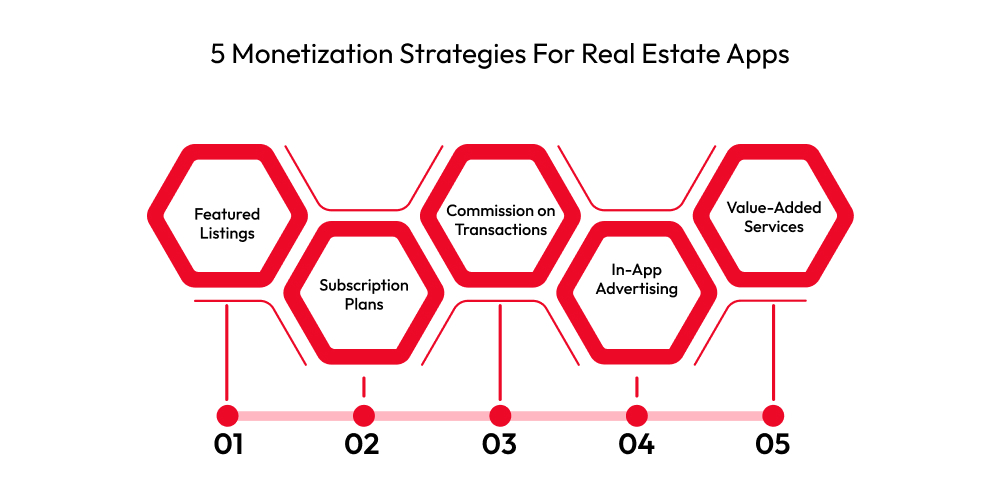
1. Featured Listings
One of the most popular monetization models is charging property owners and/or agents to feature their listings at the top of search results. All property listings benefit from having featured properties, as they take the most prime positions in the list of options on each property search result page (and afford a level of engagement as part of their virtual land purchase).
It is a non-invasive and effective way for users to derive value from property listings, aiding the seller in achieving their goals.
2. Subscription Plans
Realtor alternatives can create subscription structures for agents or agencies with different levels of features. For example, subscription-based benefits may include advanced data analytics, unlimited listings, lead creation tools, and promotional credits. According to the mobile app development firm, this provides a regular income for the app through the subscription model.
3. Commission on Transactions
The Realtor clone apps can facilitate property transactions while serving as an intermediary, charging a minimal commission only when a deal is successfully concluded, regardless of whether the transaction involves renting, buying, or selling. In this model, the app’s success is contingent on the outcomes of the users, with the app and its “value” driving efficiency and trustworthiness on the platform.
4. In-App Advertising
If you create a mobile app like Real Estate, it can earn ad commissions from promoted services, such as home loan providers, packers and movers, interior designers, local services, etc. By using appropriate placement and relevant ads, their targets are met without detracting from the user experience.
5. Value-Added Services
You can offer additional paid services, including curated virtual property staging, professional photography, legal consultation, and home loan services, among others. These complementary services not only provide a more convenient experience for users but also a distinct revenue opportunity for the app provider.
How AI Will Make Its Mark On Real Estate Developments?
AI in the real estate industry will significantly impact their operations and tasks. Alternative property valuations are formed by analyzing vast datasets to produce accurate pricing and by analyzing historical data to predict market trends. Implementing AI in the form of tailored chatbots and virtual assistants will enhance the customer experience and provide customers with personalized recommendations at any time.
Furthermore, many property developments will benefit from the AI implementation, for example, predictive maintenance on multiple properties, automated or manual rent payment, as well as seamless tenant screening.
The investment market will see enhanced risk assessments and encapsulated opportunities, efficiencies, and thoughtful decision-making during the whole life cycle of the real estate strategy.
How Much Does It Cost To Develop An App Like A Realtor?
If you are ready to develop an app like Realtor, expect to pay anywhere between $8,000 to $30,000 (or even more) to complete your project. Ultimately, how much you pay will depend on the complexity of the project, the functionality you require, your development strategy, and other factors as well.
Below Are 6 Of The Key Features That Influence The Cost Of Real Estate App Development:
1. App Features and Functionality
The more features you include (AI recommendations, AR/VR property tours, in-app chat, payment gateways, etc.), the higher the price will be as a result of the amount of work required to complete the project.
Taking features out of the process and creating only a basic MVP will reduce your overall realtor app development cost, whereas advanced features will for sure increase your price significantly.
Level |
Description |
Estimated Cost |
| Basic MVP | Core features like property listing, search, and user login | $8,000 – $12,000 |
| Intermediate | Adds in-app chat, filters, geolocation, and scheduling | $12,000 – $20,000 |
| Advanced | Includes AI, AR/VR tours, payment integration, smart recommendations | $20,000 – $30,000+ |
2. Build for iOS, Android, or Both
Developing native applications for both iOS and Android will cost more than if you only developed for one platform. If you develop cross-platform applications that can run on both systems, you can salvage some realtor app development costs without sacrificing much in terms of performance.
Platform |
Description |
Estimated Cost Impact |
| iOS or Android only | Build for one platform with native performance | Base cost |
| Both (Native) | Separate native apps for iOS and Android | +40–60% |
| Cross-Platform | One codebase for both platforms using Flutter/React Native | +20–30%, cost-effective |
3. UI/UX Complexity
The user interface of your app is the window for your user base. Designing an engaging user experience can be a great selling point for your app, but it could also prove to be a higher cost to build an app like Realtor.
Custom animations, interactive maps, and more sophisticated layouts will be required for the design, which will add to the overall Realtor app development cost.
Design Type |
Description |
Estimated Cost |
| Basic | Simple layouts, minimal customization | $1,000 – $2,500 |
| Moderate | Custom UI, interactive maps, better navigation | $2,500 – $5,000 |
| Advanced | Rich animations, AR views, micro-interactions | $5,000 – $8,000+ |
4. Backend infrastructure
The cost to develop an app like Realtor when developing the backend is related to the handling of the database, bundling of user authentication, property listings, and real-time analytics.
An extensive backend with user security, cloud services, and the ability to scale for high demand will undoubtedly influence the real estate website development cost. Other factors, such as data analytics and Blockchain incorporation, will add to the cost.
Backend Scope |
Description |
Estimated Cost |
| Basic | Standard backend for user profiles, listings, and admin panel | $3,000 – $6,000 |
| Scalable | Real-time updates, property data sync, scalable cloud backend | $6,000 – $10,000 |
| Enterprise | Secure authentication, analytics, blockchain, and third-party APIs | $10,000 – $15,000+ |
5. Development Team Location
A developer’s location can impact the cost of developing an app like Realtor. For example, developers in North America or Western Europe charge more than developers in Asia or Eastern Europe, although the level of skill may be comparable.
Region |
Average Hourly Rate |
Cost Implication |
| North America | $80 – $150/hour | Highest development cost |
| Western Europe | $60 – $120/hour | High |
| Eastern Europe | $30 – $70/hour | Moderate |
| Asia (India, etc.) | $20 – $50/hour | Cost-effective option |
6. Maintenance & Updates
Ongoing maintenance after the launch is another long-term real estate app development service cost to consider. Post-launch maintenance may include fixing bugs and performance issues as well as deploying new feature updates. To ensure a competitive and fully functioning app, it is advisable to budget for regular maintenance.
| Service Type | Description | Monthly Cost Estimate |
| Basic Maintenance | Bug fixes, server monitoring, basic support | $300 – $700/month |
| Standard Maintenance | Includes feature updates, security patches, analytics | $700 – $1,200/month |
| Advanced Support | 24/7 support, major updates, ongoing enhancements | $1,200 – $2,000+/month |
How Dev Technosys Can Help You Make An App Like Realtor?
Dev Technosys focuses on designing and developing robust, feature-rich real estate apps, such as Realtor. Our real estate app development company works with the latest technologies, including AI, AR/VR, and geolocation, to build user-friendly, scalable platforms that meet your intended business solutions.
We develop everything from clean and simple UI / UX to an impressive admin dashboard and a secure and stable backend. Dev Technosys is committed to being a one-stop shop for real estate app development solutions.
Regardless of whether you are a startup, small business, or an enterprise, we are happy to develop an app like Realtor in a timely manner, ensure smooth functionality, and develop future-ready real estate apps that inspire user engagement and business growth.
Frequently Asked Questions
Q1. What Are The Key Challenges to Create an App Like Realtor?
The development of a real estate app often comes with challenges, such as integrating several MLS databases, ensuring accurate and real-time data, and managing a wealth of multimedia data. In addition to these challenges, there’s also the challenge of acquiring users and standing out from the competition.
Q2. How Much Does It Cost to Develop An App Like a Realtor?
The cost to build an app like Realtor can vary significantly depending on the features and complexity involved in developing real estate apps. An example of the development cost range that differs from an MVP app development could be in the example of $8,000 or more, as compared to a more feature-rich app exceeding $30,000.
Q3. What New Technologies Are Affecting Real Estate Apps?
Artificial intelligence for customer recommendations, AR and VR for property tours, virtual reality, and blockchain for transaction security are the prevailing trends; additionally, IoT and predictive analytics are becoming commonplace in 2025 for smart home integration.
Q4. How Does A Real Estate App Ensure Accuracy And Security Of The Data?
Use data validation, ensuring the app integrates directly with reputable MLS databases and automated updates, transitioning the app to the most up-to-date data. Aspects of security can vary, including encryption methods of collecting and protecting customer data, data storage, and secure authenticated credentials with customers. Laws such as GDPR should also be followed.
Q5. What Are Strategies Of Monetization For Real Estate Apps?
When it comes to monetization strategies that would be considered commercialized development models, Real Estate apps account for many as they have now become a platform for freemium models and subscription fees for premium features of apps or agents, while there is also an injection-based commission.





















